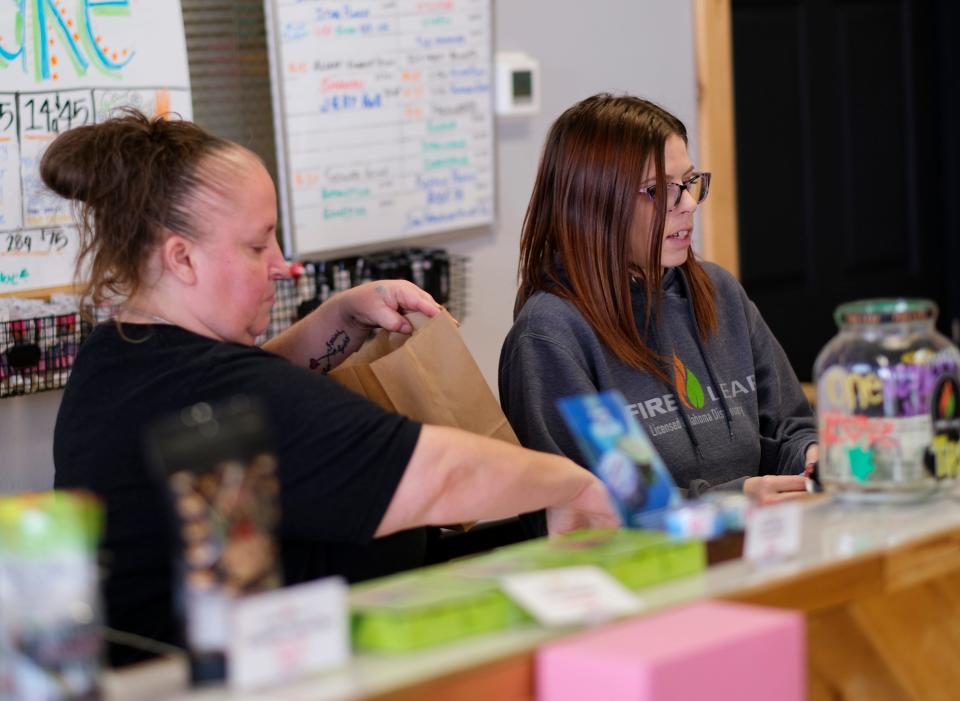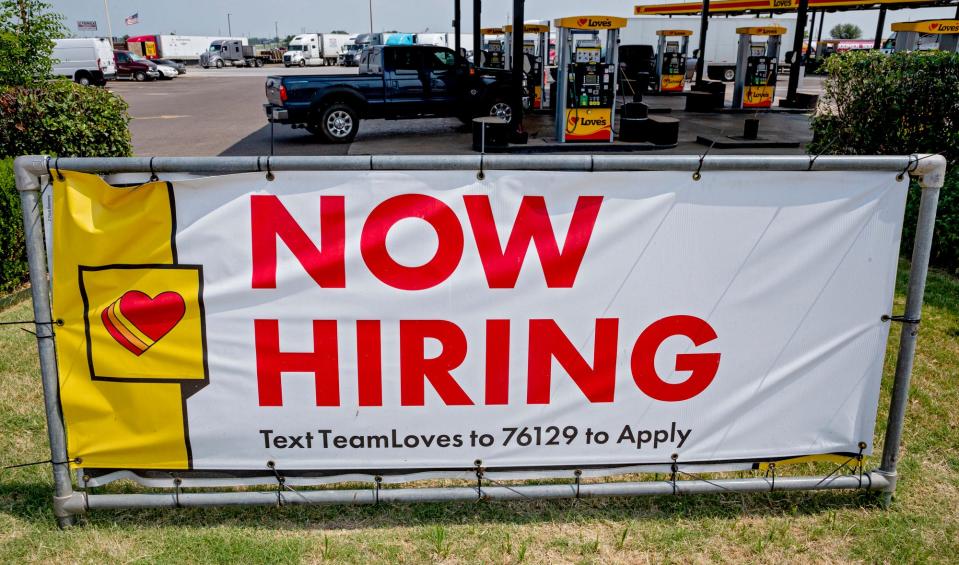Even marijuana dispensaries are struggling as the worker shortage persists in Oklahoma
In Oklahoma, even marijuana dispensaries have trouble finding workers.
Throughout the service industry, employers are facing the prospect that there simply aren't enough people to maintain pre-pandemic staffing levels. It's led to offers of higher wages and more benefits to employees, but unlucky businesses that can't recruit enough staff are finding it harder to stay open.
The state is near record-low unemployment rates, one economic metric that has returned to pre-pandemic levels. There are simply few Oklahomans in the labor force without work.
Fire Leaf, a cannabis dispensary with eight locations in central Oklahoma, has felt the pinch over the past six months, said Allison Griffith, marketing director.
"We're having the same struggles, just like everybody else is," Griffith said.
More: Law enforcement in Oklahoma's marijuana industry could change drastically in 2022. Here's why
Despite offering insurance, paid time off and other benefits, the dispensary has had trouble keeping its staffing levels.

"We are one of the more competitive dispensaries (for employees), but we still struggle with hiring simply because when there's a COVID surge, people tend to shy away from more public-facing positions."
The hardest-hit businesses are the restaurant and hospitality industries. In November alone, nearly 7% of people working in those sectors quit their jobs, far more than any other sector. That exodus created 920,000 job vacancies across the United States, according to the U.S. Bureau of Labor Statistics.
In all sectors of the economy, an estimated 4.5 million people quit in November, the most recent month for which data is available.
Where are the workers?
A National Federation of Independent Business survey showed 48% of its members raised wages in December, the highest percentage in nearly half a century. About one-third of business owners said they plan to raise compensation in the next three months.
More: Newest OKC police recruits begin academy with $5,500 signing bonus amid officer shortage
The same survey showed roughly half of all small business owners had job openings they could not fill.
"You go to some restaurants and a whole section might be dark because they don't have enough people, both in the front of the house and in the kitchen, to be able to serve those tables," said Jim Hopper, president and CEO of the Oklahoma Restaurant Association.
There are a variety of reasons why.
"They decided they wanted to go do something else, they can't get childcare, they just want to go do a different job," Hopper said.
Oklahoma Labor Commissioner Leslie Osborn has a theory that could help explain why the state's service industry is having such a hard time right now, and it has to do with the cannabis industry.
The idea is that dispensaries and other medical marijuana businesses compete with restaurants and other customer service-related jobs, thereby thinning the pool of applicants for each. Her best guess is that some 45,000 people work in Oklahoma's cannabis industry, which has grown rapidly during the COVID-19 pandemic.
More: Corrections department seeks to hire detention officers as young as 18
Before dispensaries began opening in late 2018, Osborn said many of these workers likely had service industry jobs.
"So if they were making roughly $7 an hour (at a restaurant), it appeared that they're starting at least at a minimum of $12 to $14 in dispensaries and grow houses," she said. "So it's about double the pay that they were making. And 45,000 people out of one industry or one sector into another is a huge change."
Despite Fire Leaf's current difficulties finding employees to work at its dispensaries, Griffith said the service-to-cannabis industry pipeline is real.
"I would say we saw a surge from service employees when everything shut down in 2020; bars and restaurants shut down and we were considered essential," she said.
For the most part, however, Griffith said the workforce is more diverse, with budtending and other jobs becoming a second career for some people — and a first career for many new adults starting their first job.
In Krebs, restaurant owner Joe Pritchard lost a bartender to a dispensary after the 2020 shutdown. He said restaurant workers, especially servers and bartenders, are the perfect audience for cannabis industry recruiters.
"Obviously they're not a restaurant server one day and a brain surgeon the next day," said Pritchard, owner of Pete's Place. "If they change occupations, it's one that they're qualified to do and that's certainly one that they would be highly qualified to do.
"So instead of selling spaghetti they're selling gummy bears."
Viewpoint: Labor crisis signals fundamental shift in job market. Will equilibrium return?
Solutions?
The worker shortage is a hard problem to fix. While there are suggestions, no one yet has a single answer.
An important suggestion is flexibility — the more an employer can offer work-from-home opportunities or other loosened restrictions, the more likely they'll have a happy workforce. Osborn observed among her own employees at the state Labor Department that young mothers were in serious need of a flexible work schedule.
"We noticed last year that the ones needing to use (flexible hours) the most during COVID were young mothers that would have children at home for a week with their Chromebooks because of an exposure," Osborn said.
She hopes state lawmakers will use federal funds to subsidize quality daycare, when they return to session next month.
Higher wages is another tool employers can use. It's unlikely that the Oklahoma Legislature will raise the minimum wage, Osborn said, so it's up to business owners to make the effort.
"I did call out and applaud Hobby Lobby, who made a statement several weeks ago that they were raising their minimum wage to $18.50. I think we're going to see a lot of businesses just proactively do it on their own," she said.
Hopper said offering higher wages can help, but it's not the silver bullet.
"Nobody pays minimum wage in Oklahoma. You can't hire anybody for minimum wage in any industry. You just can't do it," he said. "Is it making some difference? Yeah, it's making a little bit of a difference."

Staff writer Dale Denwalt covers Oklahoma's economy and business news for The Oklahoman. Have a story idea for Dale? He can be reached at ddenwalt@oklahoman.com or on Twitter at @denwalt. Support Dale’s work and that of other Oklahoman journalists by purchasing a digital subscription today at subscribe.oklahoman.com.
This article originally appeared on Oklahoman: Despite better wages, flexible hours, Oklahoma worker shortage goes on

